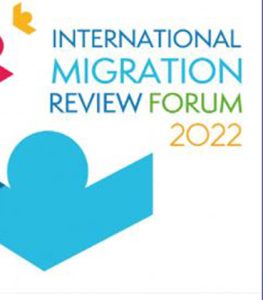New forum delivers global declaration on safer migration
A declaration calling on governments to intensify efforts for safe and orderly migration as well as a crack-down on human smuggling and trafficking and ensure that migrants are respected and receive health care and other services has been signed by more than a hundred nations.
The 13-page declaration was adopted by consensus by UN member nations attending the four-day International Migration Review Forum meeting in New York to review the first international agreement dealing with migration.
 The Global Compact was approved by the UN General Assembly in December 2018, and participants at this week’s meeting recommended that the 193-member world body also endorse Friday’s declaration in the coming months.
The Global Compact was approved by the UN General Assembly in December 2018, and participants at this week’s meeting recommended that the 193-member world body also endorse Friday’s declaration in the coming months.
Assembly President Abdulla Shahid said many migrants leave their countries to find work while others are forced to leave due to violence, poverty, environmental degradation and climate change.
“Regardless of their circumstances, the international community has a responsibility to ensure that the human rights of everyone involved are respected,” he told a news conference.
The declaration expresses concern “that progress achieved in facilitating and harnessing the benefits of safe, orderly and regular migration is slow and uneven in many areas” and stresses that “greater efforts are needed by member states to develop ambitious national responses for the implementation of the Global Compact.”
Antonio Vitorino, director-general of the International Organization for Migration, said before the adoption that there are several areas where “an extra push” is needed to make the vision of the Global Compact a reality: “respect for human rights, access to basic services, alternatives to the detention of migrants and, above all, I would emphasize, saving lives of migrants.”
The declaration said as many as 281 million people were international migrants in 2020 globally, of whom 48 per cent were women and girls and 15 per cent were under the age of 20. It recognized “the value and dignity of the labour of all migrant workers in all sectors,” and said they transferred over $US751 billion in remittances, which are “a critical source of support for families and communities,” to their home countries.
The 34-page compact addresses all aspects of migration — why people leave their home countries, how to protect them, integrate them and co-operate in returning them home safely. Its principles include recognizing the sovereignty of nations and reaffirming that migrants have the same human rights as all other people that “must be respected, protected and fulfilled at all times.”
The compact has 23 objectives “for safe, orderly and regular migration” that seek to boost cooperation in managing legal migration and discourage illegal border crossings.
These range from technical issues like collecting data, ensuring migrants have proof of their legal identity, and promoting faster and safer transfer home of earnings by migrant workers, to such matters as preventing and eradicating trafficking, providing access to basic services for migrants, and using migration detention “only as a measure of last resort.”
Mr Vitorino said 15,000 migrants have died “in dangerous and perilous migratory tragedies” since the Global Compact was adopted.
“We believe that there’s a need to scale up certain rescue operations particularly to those migrants who go through the sea, through the desert, and through the jungle,” he said.
“We have a number of hot spots and know where the problems are,” Vitorino said, pointing to the Gulf of Aden, the central Mediterranean and the Darién Gap jungle, the inhospitable stretch of land that separates Colombia and Panama.
“We need to be more effective in opening regular pathways for migrations,” he said. “That’s the real alternative to letting migrants be prone to traffickers and smugglers because trafficking and smuggling is the most obnoxious attempt against the fundamental rights of migrants.”
The UN’s top migration official said all migrants move in vulnerable conditions but some are more vulnerable than others including women and girls who have been “particularly prone to abusers, gender-based violence, rapes.”
The declaration said migrants continue to struggle to get humanitarian assistance, including search and rescue efforts at sea and medical care, “which creates and exacerbates situations of vulnerability.”
“Limited progress has been made in distinguishing the activities of smuggling networks from the provision of assistance of an exclusively humanitarian nature for migrants along perilous routes and in other situations where their life or safety is in danger,” it said. “In many cases, the provision of such assistance has been considered unlawful.”
In the declaration, governments said they commit to eliminating all forms of discrimination targeting migrants including racism, xenophobia, stigmatisation hate speech and hate crimes. They also commit to protecting freedom of expression and “to respecting, protecting and fulfilling the human rights and fundamental freedoms of all migrants.”
Vitorino said the declaration provides guidelines for action “and we are ready to work over the next four years to make, each day, a difference, making outcomes better, thinking above all of the millions of lives of migrants that depend on international protection and international cooperation”.












